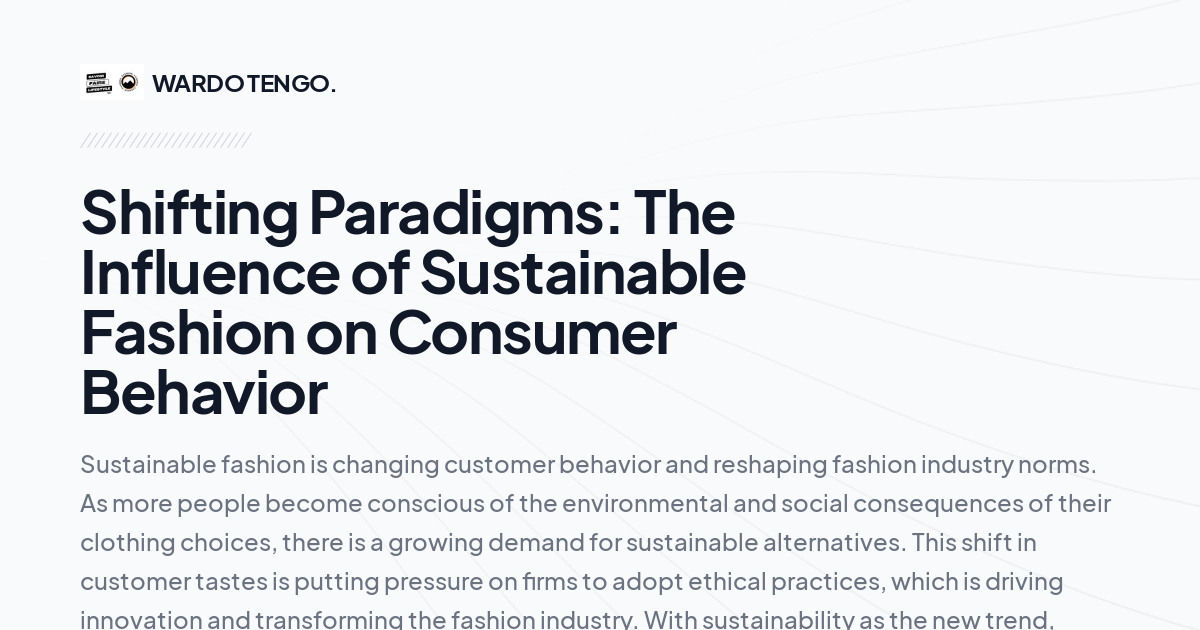Introduction
As the fashion industry faces mounting pressure to address its environmental and social impact, the concept of sustainable fashion has gained significant momentum. Beyond rethinking production methods and materials, sustainable fashion is also reshaping the future of retail. This blog post explores the intersection of sustainable fashion and the future of retail, discussing innovative approaches and technologies that are transforming the way we consume and experience fashion.
Redefining Retail: The Rise of Sustainable Fashion
Sustainable fashion is challenging the traditional retail model by emphasizing conscious consumption and responsible production. Consumers are increasingly seeking brands that align with their values, pushing retailers to adopt sustainable practices. From sourcing eco-friendly materials to implementing circular business models, fashion retailers are redefining their strategies to offer more sustainable options. This shift goes beyond the products themselves, encompassing ethical labor practices, supply chain transparency, and engaging storytelling that connects consumers with the sustainable values behind the fashion items.
The Rise of Conscious Consumers and Digital Transformation
The rise of sustainable fashion is closely tied to the growing consciousness among consumers. Social media platforms and online communities have played a significant role in raising awareness about sustainable practices and encouraging mindful consumer behavior. The digital revolution has also transformed the retail landscape, enabling brands to reach a wider audience and engage with consumers on sustainability issues. Online platforms, such as dedicated sustainable fashion marketplaces and rental services, provide convenient and accessible alternatives that reduce the need for traditional retail infrastructure.
Sustainable Retail Innovations
Innovative retail concepts are emerging to meet the demands of sustainability-conscious consumers. Pop-up stores, temporary retail spaces, and concept stores focused solely on sustainable fashion are gaining popularity. These initiatives allow brands to showcase their ethical and eco-friendly products in unique and immersive settings, fostering deeper connections with consumers. Furthermore, technological advancements like virtual reality (VR) and augmented reality (AR) are revolutionizing the way consumers engage with fashion, enabling virtual try-on experiences and reducing the environmental footprint associated with physical shopping.
Collaboration and Transparency
Collaboration and transparency are vital components in the future of sustainable fashion retail. Brands are partnering with sustainable initiatives, non-profit organizations, and ethical suppliers to drive positive change across the industry. Collaborative efforts are fostering innovation and knowledge sharing, leading to the development of sustainable materials, responsible production techniques, and circular solutions. Transparent supply chains and certifications, such as Fair Trade and organic labeling, provide consumers with the information they need to make informed choices and hold brands accountable.
Conclusion
The future of retail lies in the hands of sustainable fashion. As conscious consumers drive the demand for eco-friendly and ethically produced fashion, retailers are responding with innovative strategies and technologies. The rise of sustainable fashion is not only transforming the products we wear but also reshaping the entire retail landscape. From redefining the retail experience to adopting digital solutions and fostering collaboration, sustainable fashion is pushing the industry towards a more responsible and transparent future. By embracing sustainability in retail, we can create a fashion industry that not only satisfies our desire for style but also respects the planet and its people.




